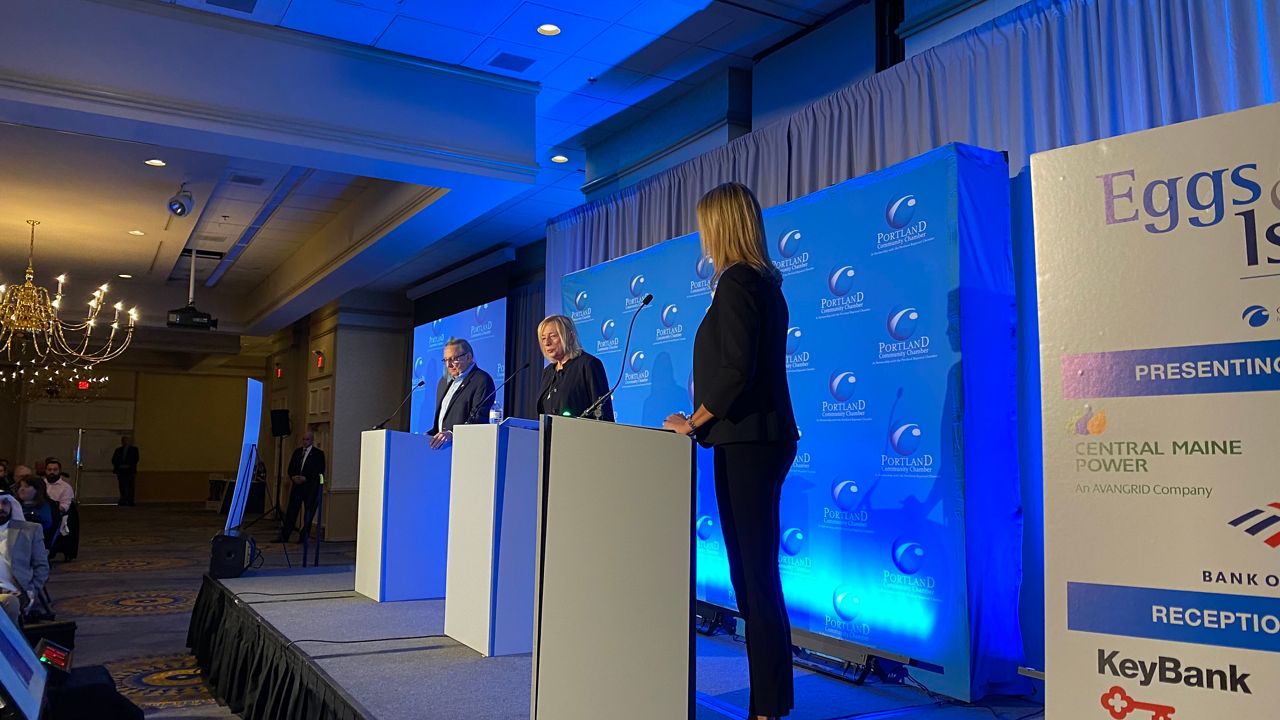The two leading candidates for governor sparred Thursday about the economy and offered differing visions for how to address a potential national recession.
Former Gov. Paul LePage, a Republican running for a third non-consecutive term, wasted no time declaring that Maine is in a recession and blaming current Gov. Janet Mills, a Democrat.
“Today, Maine is in real trouble,” LePage said during a debate hosted by the Portland Regional Chamber of Commerce. “We are in a recession and Janet Mills’ record is disastrous.”
Throughout the hour-long debate, attended by hundreds of southern Maine business leaders, LePage criticized Mills for spending one-time federal pandemic funds. He said Mills benefitted from the COVID-19 pandemic that’s killed 2,596 Mainers and shut down businesses and schools in 2020.
“This governor has been very, very fortunate that COVID came because with COVID came nearly $15 billion from Uncle Joe,” LePage said, referring to President Joe Biden.
LePage also accused Mills of trying to buy the election by giving Mainers $850 inflation relief checks this summer.
Those checks were included in a bipartisan budget approved by the Legislature and were supported by a number of Republicans. At the time, Mills said it made sense to issue the one-time checks rather than create new programs that would need ongoing funding.
During the debate, Mills said her administration has saved money so it is prepared to deal with a recession. She touted the nearly $900 million in the state’s rainy day fund, the state funding its full share of local education costs and the restoration of revenue sharing with cities and towns.
She pointed to two government reports released Wednesday that show that the state is in good shape to handle a recession. One of those reports, issued by the State Budget Bureau, projected that state revenues will exceed money allocated in the budget.
“Maine has the reserves to withstand a recession for the next 15 months,” Mills said. “I don’t think there’s a need to go into raising any taxes whatsoever and I have said I’m opposed to raising taxes.”
Mills also criticized LePage for cutting public health nurses at the Maine Center for Disease Control and Prevention during his tenure, which ended in January 2019.
“Thank God we had that first year to rebuild the CDC and rehire all the public health nurses that were laid off during my predecessor’s administration,” she said. “Thank God we got to do that before the pandemic hit us.”
LePage said he reduced the number of public health nurses because the program lacked proper oversight and wasn’t performing well.
When it comes to education, Mills promoted her efforts to provide free community college, which she said resulted in a spike in enrollment of around 13%.
She said she’s invested in new equipment for career and technical education programs and that her administration has emphasized certificate programs in addition to full college degrees.
More than once, LePage talked about his belief that there are too many schools and not enough students to fill them. He said schools should be consolidated to save money and to free up buildings that can be converted to affordable housing.
As they did during their first debate on Tuesday, Mills and LePage traded barbs over $15 million in housing bonds that were approved by voters but that LePage refused to issue. Mills said those bonds helped build affordable senior housing. LePage said he feared the money would be scooped up by developers who would then build market rate — rather than affordable — housing.
Also, Mills said she would oppose giving cities and counties the option to implement a local sales tax. LePage said if schools are consolidated to save money, he would support allowing counties to institute a local option tax.
In closing statements, Mills emphasized her background, saying she delivered newspapers as a young girl and waited tables to get through college. A former district attorney and attorney general, she said she fought “anyone who tried to hurt Maine people.”
“We made it through a once-in-a-lifetime pandemic,” she said. “We fully funded schools for the first time in state history.”
LePage referenced “an extreme woke agenda” and said small business are “under attack.”
“On Nov. 8, we have a choice to make,” he said. “A prosecutor or a job creator.”
Unlike the first debate of the election cycle hosted Tuesday, LePage and Mills appeared relaxed and cordial, despite their differences.
Missing from the stage was independent Dr. Sam Hunkler, a semi-retired physician from Beals. A chamber spokesman did not return a phone call asking whether Hunkler was not invited or declined to participate.



